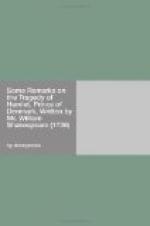Concerning the Design of this Scene, we shall find it is necessary towards the whole Plot of the Play, and is by no Means an Episode. As to Laertes’s Character, I shall lay some thing of it else where.
Page 246
Scene. The Platform before the Palace.
Enter Hamlet, Horatio and Marcellus.
The Beginning of this Scene is easy and natural. The King’s taking his Rowse, seems introduced to fill up a necessary Space of Time, and also perhaps to blacken still more the Character of the Usurper, who had revived a sottish Custom (as appears by the Prince’s Remarks upon it) omitted by several of his Predecessors; for it would have been improper to have had the Ghost appear the Minute the Prince was come on to the Platform. Some Time was requisite to prepare the Minds of the Spectators, that they might collect all their Faculties to behold this important Scene, on which turns the whole Play, with due Attention and Seriousness; although, indeed, I must think that the Prince’s Speech would not be much worth preserving, but for That Reason: for expressed and amended, according to the best that can be made of it, (as Mr. Theobalds has done it) it is but of very obsure Diction, and is much too long; for a very short Moral is to be drawn from it.
Page 248.
Enter the Ghost.
We now are come to the sublimest Scene in this whole Piece, a Scene worthy of the greatest Attention; an Heroical Youth addressing the Shade of his departed Father, whom he tenderly loved, and who, we are told, was a Monarch of the greatest Worth. Surely there cannot be imagin’d any Scene more capable of stirring up our noblest Passions. Let us but observe with how much Beauty and Art the Poet has managed it. This Spectre has been once spoken to by the Friend of our young Hero, and it must be confessed, that Horatio’s Speech to it is truly great and beautiful: But as the like Incident was again to happen; that is, as the Ghost was again to be addressed, and with this Addition, by the Hero of the Play, and Son to the King, whose Spirit appears; it was necessary, I say, upon these Accounts, that this Incident should be treated in a sublimer Manner than the Former. Accordingly we may take Notice, that Hamlet’s Speech to his Father’s Shade is as much superior to that of Horatio upon the same Occasion, as his is to any Thing of that kind that I have ever met with in any other Dramatick Poet.
Hamlet’s Invocation of the heavenly Ministers, is extremely fine; and the begging their Protection upon the Appearance of a Sight so shocking to human Nature, is entirely conformable to the virtuous Character of this Prince, and gives an Air of Probability to the whole Scene. He accosts the Ghost with great Intrepidity; and his whole Speech is so full of the Marks of his Filial Piety, that we may easily observe, that his Tenderness for his Father gets the better of all Sentiments of Terror which we could suppose to arise, even in the Breast of the most undaunted Person, upon the seeing and conversing with so strange an Apparition.




